 Your new post is loading...
 Your new post is loading...
Reputation is everything. And on the internet, that couldn't be more true.It's important to always know what people are saying about you -- whether it's your customers, your competitors, or the press. And on any given day, it can be tricky to keep up with what your audience is sharing across a variety of social media platforms. So, we've rounded up some of the best free social media and brand monitoring tools from around the vast web of social networks. Nearly all of these tools are free, but some offer paid versions with more features and capabilities. Let's dive into each one -- and see if you want to test them out today....
But to little old me, a sincere apology goes a long way. When I sense genuine remorse, it means a lot to me -- perhaps because it's so rare, at least in my experience. Combined with my nerdy affection for all things marketing, that sentiment applies to brand apologies, too. It's not so much that I think, "Wow, that means a lot to me," but more like, "Wow, that company really nailed saying, 'Sorry.'" So, who's done it best? We rounded up some of our favorite brand apologies to inspire you next time you make a mistake -- and need to admit your wrongdoing....
IAn instant is all it takes to threaten your business's sterling reputation online. You might have had an off day or the misfortune of dealing with an ornery customer, but it's almost inevitable that you'll come face to face with a negative online review at some point in your career. But, as Adrienne Weissman, CMO at G2 Crowd, recently pointed out, negative reviews aren't all bad. Some 70% of Americans read reviews before making a purchase, and those who seek out negative reviews tend to be more engaged and are 67% more likely to make a purchase. Plus, 68% of people trust a company more when their reviews are a mix of good and bad. Of course, the key to making the best of a bad review lies largely in your response. That means you need to be able to find reviews (both good and bad) as they pop up. That's definitely more social media monitoring than one person can handle... And that's where reputation management tools come in. The following five reputation management tools are some of the best on the market for tracking mentions, discovering influencers, and managing online reviews as they happen....
Welcome to the findings of the BrightLocal Local Consumer Review Survey 2015.
This annual survey is an exploration into how consumers both read & use online reviews. It seeks to qualify the value that users place on reviews that they read & how this impacts their opinions & actions when searching for a local business to use. The survey is specifically concerned with reviews for local business services and not wider product reviews. Key 'Takeaways' From Research: - 92% of consumers now read online reviews (vs. 88% in 2014)
- 40% of consumers form an opinion by reading just 1-3 reviews (vs. 29% in 2014)
- Star rating is #1 factor used by consumers to judge a business
- 44% say a review must be written within 1 month to be relevant
- Only 13% of consumers consider using a business that has a 1 or 2 star rating
- 68% say positive reviews make them trust a local business more (vs. 72% in 2014)
- Consumers are becoming more concerned about fake reviews
So people don’t trust brands – but what does that MEAN?
That they think you’re overcharging them?
That they’re worried you’ll lose their credit card information to hackers?
That they wouldn’t ask you to watch their cocker spaniel for the afternoon?
Mistrust comes from a disconnect between what you say and what you do.
A whopping 78% of people think that in general, brands are NOT open and honest. In fact, only 1 in 4 people thinks that brands actually do what they say they’re going to do – a level of mistrust typically reserved for badly behaved toddlers and black market organ dealers.
This doesn’t mean you or your business have necessarily made people feel misled – but it means you still have to work a lot harder to make up for the damaged caused by brands in general....
This year’s Trust Barometer shows something amazing. The biggest increase in trust hasn’t been in the media or NGOs or the government… it’s been in the private sector.
The general public wants businesses to lead the way when it comes to societal issues. More specifically… Edelman says the data shows people want CEOs to be more visible.
They want to know the person leading a business. They want to know their values and where they stand on social issues....
Every business must serve a social purpose”. These are not the words of a social campaigner or a politician; they are the words of a banker, Ashok Vaswani, the CEO of Retail and Business Banking at Barclays, one of the world’s largest banks. Barclays has been involved in at least one major trading scandal and holds the dubious honour of the most fined bank in Britain. There will be some people who will treat his words with understandable cynicism but that would be to miss the point.
The point is not whether the words are sincere or not – it is that they should have been said at all. Banks are concerned with the control of money, why should they concern themselves with any purpose beyond that? The reason is that society is demanding they do. When banks first started they fulfilled a social need in the community, to enable ordinary people to fund their ambitions. Over the years banks forgot that purpose and focused most of their efforts on funding their own ambitions through obscene profits, often at the consumer’s expense. The bubble burst in spectacular fashion with the downfall of Lehman Brothers in the US and RBS in the UK.
It isn’t just the banks that have lost their way. Now it’s critical for any business to demonstrate it has a purpose before, and beyond profit; that it seeks to improve the lives of its customers as a primary goal. Failure to have such a purpose, to be clear about it and to ensure it directs everything you do, will lose customers, employees and ultimately business value....
“Many companies are showing greater willingness to take public stances on controversial issues,” said West. “While the vast majority of consumers in our study said they are likely to purchase from companies they agree with, only 3 in 10 have actually done so.
This makes me think consumer behavior hasn’t quite caught up to this new environment in which companies take stands on controversial topics.”
But the risk is evident—and ultimately begs the question: From a company perspective, is it worth it?
“The overwhelming majority of consumers in our study agreed they are more likely to buy from companies they see eye to eye with, and almost half of consumers said they had already stopped buying from a company over a difference of opinion. This tells me that consumers are willing to vote with their dollars,” said West. “But there may be more danger for many companies than opportunity—especially if you serve, as most companies do, a market with diverse political views.”...
What do you do when your business has a poor reputation online or received a poor review?A lot of businesses and individuals often wonder how they can better their online reputation.
First, let me tell you how NOT to address negativity online. Don’t create fake reviews. Fake reviews, especially the kind that are paid for, are easily identified by your potential consumers and that will break their trust in you. In addition to being caught by potential consumers, you will likely be caught by site owners and/or Google. For sites like Yelp, they have publicly shamed businesses that they have caught....
Within the last couple of years, you are now starting to see actual companies sharing their revenue numbers and many other things (likeemployee’s salaries). Often times, these sorts of posts are the most read. It attracts readers of all kinds, not necessari,ly just potential customers.
Some of the companies doing this are venture backed, and some are bootstrapped. It’s what makes them fun to read. You see a diversity of tactics and strategies being implemented based on what stage they are in.Here is a list of companies providing regular revenue reports that are worth the read, along with a quote from their founders about why they do it....
Search engine optimization experts share tips and tools to help you manage your company's online reputation.
A handful of companies offer free and paid online reputation management services for consumers and businesses, including Reputation.com and Brand Yourself. In addition to using these services, or in lieu of them, both small and midsize businesses and enterprise digital marketers can take strategic steps to ensure their companies' online reputations are solid.
The following 15 tips and eight tools are all valuable and effective ways to help manage your organization's corporate reputation online....
Ever Googled yourself? What did you see? Did you like your web “you”?
That’s the only way some people see you today in a digital world.
You are defined by your online content, brand and persona. Sometimes a personal branding focus can be seen as an overt attempt of self promotion.
In crowded job market and a competitive business world some packaging and promotion is essential.
The proportion of corporate directors who say their companies are monitoring social media for “adverse publicity” (a gentle euphemism) has increased from 32% in 2012 to 41% today, according to the latest Corporate Directors Survey from PricewaterhouseCoopers.
However, as these figures indicate more than half of corporate directors still believe their companies aren’t doing a good enough job of keeping an eye out for adverse publicity: 55% of the PwC survey respondents said their companies either aren’t monitoring social media efficiently, or aren’t doing it at all. That’s down moderately from 61% in 2012.
PwC found a similar story in regards to social media strategies for applications like marketing, research, and internal communications. Thus 40% of respondents said their companies are leveraging social media for strategic goals, while 54% said their companies’ efforts to leverage social media are insufficient or nonexistent; both figures are unchanged from two years ago....
|
Hootsuite founder and CEO, Ryan Holmes, dishes on why social media is not just important for brands, but for the heads of the brands as well. When it comes to marketing, social media is often discussed as a channel directive. It is a channel marketers need to cultivate an audience on, and can be used to humanize their brand to an extent. Social—especially in the age of Trump—is now often a medium where brands must defend themselves against major scandals. But we rarely bring CEOs into the marketing/social media mix.Ryan Holmes, founder and CEO of Hootsuite, spoke with us in the latest DMN One on One podcast. We caught up with Holmes a few days before the release of his latest book, "The 4 Billion Dollar Tweet." Here's our conversation on how CEOs can, and why they should, get savvy with social media....
Scholars in public relations have contended that organization-public relationship (OPR) quality has multiple dimensions, including the oft-cited list of trust, satisfaction, control mutuality, and commitment. The concept of OPR quality is assumed to be positive (Heath, 2013), which nevertheless does not describe relational problems in reality. In this blog post, I introduce an additional side of OPR quality—distrust, and how it differs from trust. Distrust is often considered as simply the opposite of trust by organizational researchers and excluded as a component of OPR quality in the public relations literature. However, distrust is not the absence of trust. For example, an employee may have both low levels of trust and distrust in his or her colleagues who resemble casual acquaintances in the organization. They only occasionally cross paths with these coworkers. They are not confident in or very watchful of these relational partners. Also likely the employee could feel both high levels of trust and distrust in his or her superiors. They trust the management, as representatives of the organization, in some aspects but distrust in other aspects. In an employee survey (N=583), I tested distrust as a new dimension of OPR quality (Shen, in press). I found that both distrust and trust were distinct from each other. The study suggested that OPR quality is not inherently positive. Employees may perceive sinister intentions of the organization’s conduct. Even those who highly trust their employing organizations do not necessarily perceive low distrust, and vice versa. Employees could feel confident about the organization’s capabilities—trust, while at the same time they are skeptical about whether the organization keep employees’ interests in mind when making decisions—distrust....
No matter how secure and well-placed a brand appears to be, the danger of an online reputation crisis is always lurking. The open nature of modern day communication channels, like blogs, social networks and review sites, means that one bad customer experience or a small lapse in service standards can quickly damage a brand’s reputation. Negative experiences shared more often Research shows that consumers are much more likely to share negative experiences on social networks and other public platforms. A damaged online image can have severe effects on a brand’s value and business performance. A study by Deloitte shows that nearly 41% of companies that experience a negative reputation event reported loss of brand value and revenue....
Americans hold a more favorable opinion of CEOs who take public stances on controversial topics, according to “The Dawn of CEO Activism,” a study released by Weber Shandwick and KRC Research. Weber Shandwick has identified CEO activism as a factor that can “drive and differentiate corporate reputation.” Leaders taking a stance on hot-button issues is powerful. However, “The Dawn of CEO Activism” advises caution, stating that CEOs should be careful in choosing topics they speak out on. The research, which can be found here, extracted five key tenets of CEO activism, illustrating the pros and cons of vocal corporate leadership....
Since 2012, Cohn & Wolfe has studied authenticity as a guiding principle and business practice. Each year, our research reveals more insight on the strategic power of authenticity and its unique opportunity to build reputation.
Cohn & Wolfe has discovered a huge authenticity gap in the eyes of global consumers. With 75 percent of consumers surveyed in 14 markets believing that companies are not open and transparent, it’s clear that brands have a credibility problem.
Our 2016 findings reveal that cynicism towards brands is highest among Western European countries, while high growth / low per capita GDP countries recognize authenticity in brands the most.
Across global markets, approximately one in five consumers finds brands “Open and Honest.” At 23 percent, the US places just above the global average. In Western Europe, a mere 5 percent of consumers in Sweden consider companies “Open and Honest,” while the UK, France, Germany and Spain all match the same low level at 7 percent.
Brazil, while generally higher than Western Europe, is still lower than the US at 19 percent.
Even in China and Indonesia, where consumers are least pessimistic about brand authenticity, only about a third of the population (36 percent and 35 percent, respectively) consider companies “Open and Honest.”
The opportunity for businesses to close this gap is staggering....
When it comes to conducting business online, trust is one of the scarcest and hardest-to-earn resources. No amount of money can purchase it, and it’s incredibly difficult to replace once it has been lost. Trust can be a defining factor that drives potential customers to choose your products or services over those of your competitors, so you can’t afford to overlook it.
To make establishing trust easier, let’s examine some simple tips that you can start incorporating into your marketing strategies today. These seven techniques involve educating consumers, personalizing marketing messages, and providing a positive user experience to help you get the most out of your investment and increase sales....
No matter how on message anyone is, there still may be a difference between what a company or brand says about itself and its reputation, and what consumers say about them. FleishmanHillard calls this the “authenticity gap.”
Every year, the company uses research and data to see which companies are on the right track, and whether they are focused on the things that matter most to the audiences that are most important to them. Last month, a group gathered in Toronto to discuss the authenticity gap and how it applies to them. Below is a broad overview from Nick Drew, FleishmanHillard’s Canadian head of research, of the data turned up in 2015....
We all know that social media plays a huge part in building and boosting your personal brand in the digital world, but do you feel lost sometimes with all the different social media channels and are not sure where to start?
There are tools that can help!Here are 9 cost-efficient social media tools that we recommend to help make your personal branding efforts easier.....
The 'Reputation Complex' is a moving combination of various reputational factors, components and drivers that are linked in a close and complicated way. This combination brings with it, for all organizations, equal risks and opportunities – the first to be managed and the second to be exploited in the right manner.
MSLGROUP's SVP and Chief Strategy Officer, Pascal Beculer shares his thoughts on the fast transformation of Reputation Management, everywhere in the world, and what it means for our clients and for us....
People often ask me, “Will customer reviews help or hurt my business?” Several months ago, I advised readers not to panic over customer reviews and to claim their accounts on Google Local, Yelp, and other sites that list businesses and accept reviews. Since then, I’ve come across a mix of opinions regarding customer reviews, and I still think that good, honest businesses benefit from reviews, even if they aren’t always full of praise.
Recent research shows that consumers who post reviews not only refrain from being overly negative, but want reviews to be balanced and informative. This is really good news for honest business owners like you....
No, we're not talking about Apple or Amazon or Big Data or the Marketing Cloud or Programmatic Buying.
Chevy’s Rikk Wilde “looked down at his notes often, spoke haltingly and explained to the pitcher that he'd like the Colorado” —Marketing Daily’s Karl Greenberg has the skinny today on its new “inner truck guy” conventional campaign — “because it has ‘class-winning and leading, you know, technology and stuff,’” James R. Healey reports in USA Today.
“The nervous Wilde was assured this morning he still has a job,” Greg Gardner and Alisa Priddle reported in the Detroit Free Press last evening. “And in fact he appears to have garnered millions in free publicity for the Chevrolet brand, which has received at least $2.4 million in media exposure from the unconventional presentation, according to Front Row Analytics. Bloomberg reports that is six times more than the $392,000 it would have brought in with a more polished performance.
”It did not take long for #technologyandstuff to pop up on Twitter with GM president North America Mark Reuss (@GMdudeinNA posting, “It's what I've been saying for years.....#technologyandstuff,” Gardner and Priddle report....
... We found that the better a company's reputation was, the more likely that company was to be successful.
For example, of the respondents who said they had a "better-than-average" reputation, 52% had a success score between six and nine and 25% had a success score above nine (the highest score of any respondent was 14). Only 2% of companies with a better-than-average reputation had a success score below three.
If you've been trying to gain the resources and approval to improve your company's reputation, you can use this chart as part of your justification for increasing your budget and bettering your customer service.
Not sure what you can do to improve your ecommerce site's reputation? Here are five ideas to get you started....
|



 Your new post is loading...
Your new post is loading...





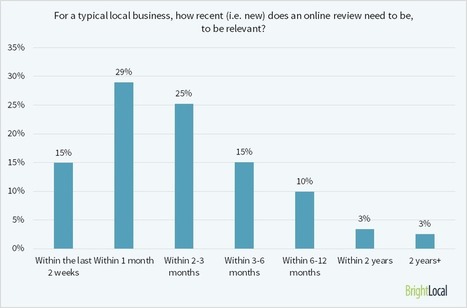


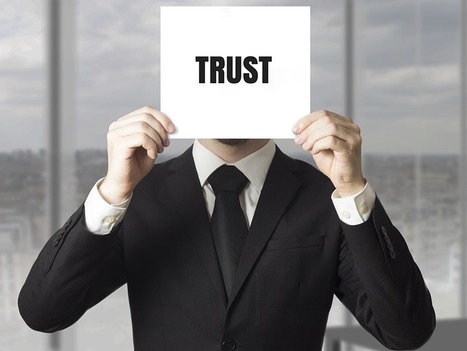
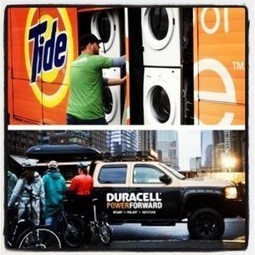



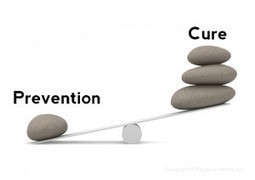








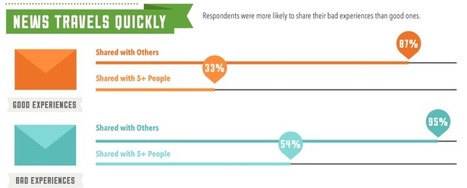

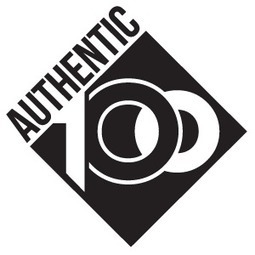


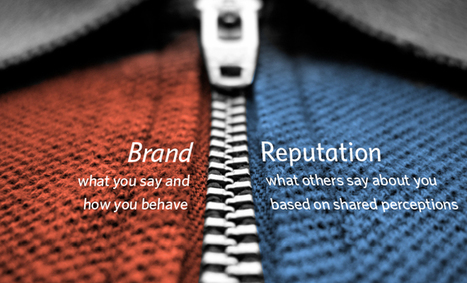
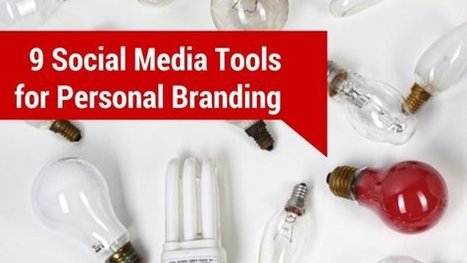





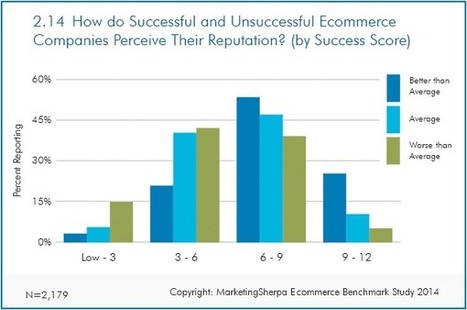





Check out these free social media and brand monitoring tools to take your social game to the next level.